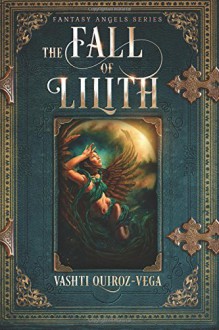
I have seen this book described as “epic” and I agree, not only for its length (it is two books in one) but also for its topic. It does talk about all things in Heaven and Earth, near enough, from the creation of the angels and the battle of good and evil to the fall of the angels and their revenge plans once on Earth (that don’t bode well for humanity).
The author’s writing style in this book is reminiscent of the Bible, although the story is told from quite a different point of view, and it deviates from the narrative most Christians are familiar with (I am intrigued to know how the story will resonate with readers not familiar with the Christian tradition, although the world building is detailed enough for anybody to be able to follow the events). I am not a bit Fantasy reader, mostly because I am not that fond of lengthy descriptions (I admire authors who do it well), although this story has the added interest of providing a major variation on a story many of us are familiar with. As typical of the genre, there is plenty of telling (in fact, all the characters are storytellers, and we get to hear the angels’ voices often, narrating their own adventures, or even fictional ones, like a fascinating story Lilith narrates in book 1), and beautiful descriptions of Floraison, the part of Heaven inhabited by the angels, of the angels, and also of the creation of Earth, and of Earth itself in book 2. We follow the story in a chronological order, from the time when the angels are quite young, growing up and learning about their powers (this part reminded me of YA books set up in special schools for young people with special abilities, and also of parts of The Hunger Games, when the characters had to train for the battle ahead), through to the battle between good and evil and their fall to Earth. Although the story is narrated in the third person, we follow the points of views of a variety of angels, mainly Lilith, the main character, but also most of the others at some point.
These angels reminded me of the Greek gods. They are not the celestial beings many of us imagine, but more human than human. They have their personalities, their peculiar characters, their flaws, their desires, and they are far from goodie-goodie-two-shoes. Even the good angels have faults… (Oh Gabriel…). We get to know Lilith’s cunning and devious nature better than that of others (she is rebellious, proud, has a superiority complex, and does not seem to feel true affection for anybody, even her supposed friends), but we see that Lucifer is proud and is not a good looser from early on (when he is following the rules), and some of the other angels are weak, easily manipulated, and only worried about their own well-being and interests. The God of this story does not tolerate rebellion or deceit, and he severely punishes his children for their misdeeds. The author excels at writing the punishments and tortures the angels are subject to, and these parts of the book are not for the faint-hearted. I know she writes horror too, and this is quite evident in her penchant for devising monstrous characters and pretty cruel and sadistic tortures.
As is often the case, the bad characters are more interesting than the good ones (that we mostly lose sight of in book 2, apart from some brief appearances). I would not say any of the characters are very sympathetic. Lilith is put to the test and punished for being what she is (and considering angels are given free-will, that seems quite cruel), but she displays psychopathic traits from the beginning and it is difficult to blame her nasty personality on her experiences. She is strong and determined, but she abandons her friends, is manipulative, and goes to extremes that make her exceedingly unlikeable. I have no problem with having a truly horrible character as the main voice of a book, although I missed something that helped me connect with her (there are moments when she hints at a weakness or hurt, but I did not feel they were particularly convincing. Perhaps a sense of humour, no matter how dark, would have helped, but other than some instances of silly behaviour very early on, there are moments of wonder but not many laughs). Gadreel is perhaps the easiest character to empathise with, and she grows and develops during book 2 (to begin with she is constantly complaining and moaning, but she gets more confident, although she is not traditionally good either). Satan does horrible things, especially to Lilith (who is not blameless by a long stretch, not that such abuse could be ever justified in real life), but he is an interesting character and quite loyal to his friends. And he also does much of what he does out of love, however misguided. I don’t know what that says about me, but I really like Dracul, Satan and Lilith’s child. He is described as quite an ugly thing, but I find him cute. There you have it.
For me, book 2 is more dynamic and moves faster than book 1. I particularly enjoyed the fact that the adventures of the fallen angels on Earth allow us to read about their first impressions of the world as it would appear to somebody who had never been here, a totally brand new place. Such estrangement and sense of wonder are fascinating and the writing captures it well. The fact that the fallen angels find themselves in a hostile environment and have to learn to work together to survive adds to the interest. Of course, Lilith has her own plans, and she makes sure she convinces others to follow.
The character of Lilith reminded me of the typical figure of the femme fatale in film noir (or the spider woman, or… well, I’m sure you can think of many epithets such females have received over the years), who is powerful but her power consists in manipulating and deceiving males, convincing them that they are in charge, while she pulls the invisible strings. I do admire such characters, especially when the circumstances are dire and that seems to be the only option to get ahead. There is always a difficult balance to maintain between creating a strong negative female character that can hold her own and ensuring it does not reinforce the usual story tropes that blame women for all of world’s ills from the beginning of times.
This book made me wonder once more about the well-known narrative (and let me tell you, there are some twists that will keep readers on their toes) of events, which amounts to a civil war in Heaven, where there is no reconciliation and no possible redress or forgiveness for those who rebelled against the established order and lost. I also had to wonder about the rules imposed in Floraison and what seems to be a bias against LGBT (sex is bad, but same-sex sex is worse and is more severely punished), which has always been an issue that has caused much religious debate.
This book is a tour-de-force that I’d recommend to readers who love to be challenged by narratives that push the limits of well-known stories and make us rethink and reconsider the stories we have been told. And one for those who love strong and wicked female characters. And baby demons…


 Log in with Facebook
Log in with Facebook 


 Audible
Audible







